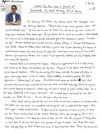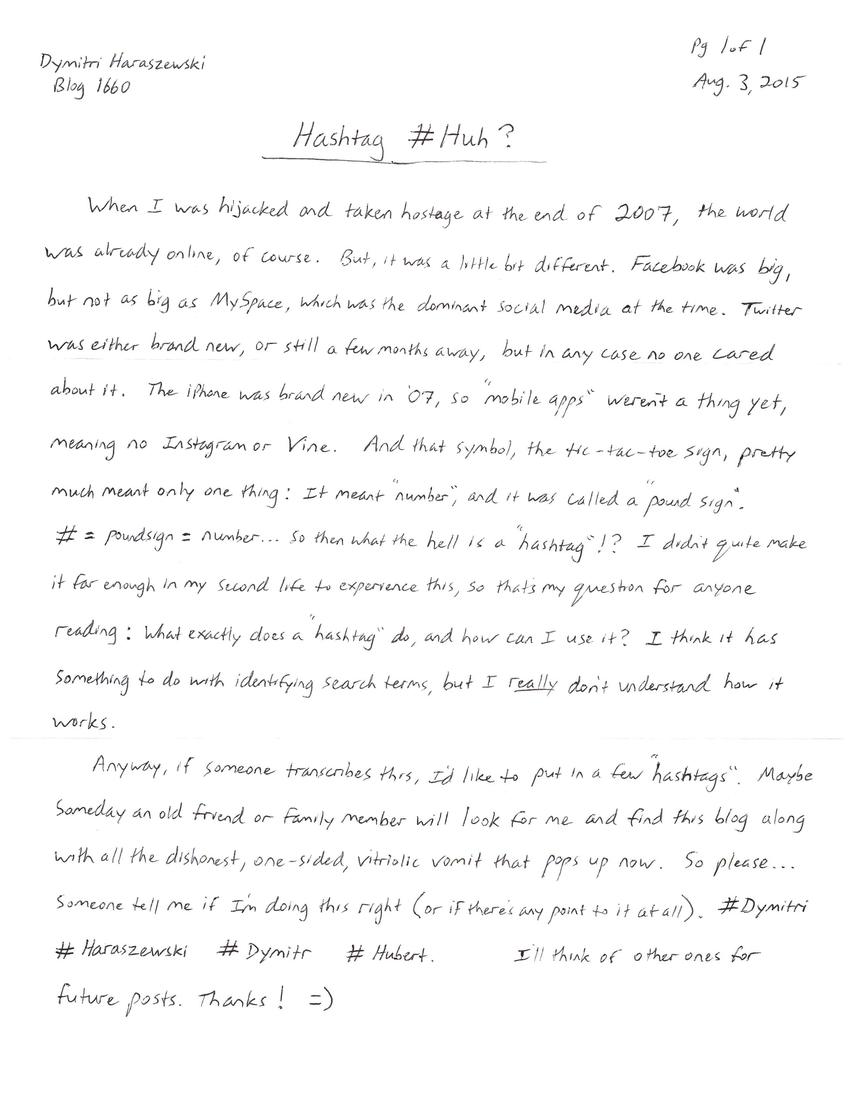
Transcription
Aug. 3, 2015
Dymitri Haraszewski
Blog 1660
Hastag #Huh?
When I was hijacked and taken hostage at the end of 2007, the world was already online of course. But it was a little bit different. Facebook was big but not as big as MySpce, which was the dominant social media at the time. Twitter was either brand new or still a few months away. But in any case, no one cared about it. The iPhone was brand new in '07, so "mobile apps" wren't a thing yet. Meaning no Instagram or Vine.
And that symbol, the tic-tac-toe sign, pretty much meant only one thing: it meant "number", and it was called a "pound sign". # = pound sign = number. So what the hell is a "hashtag"!? I didn't quite make it far enough in my second life to experience this, so that's my question for anyone reading: What exactly does a hashtag do and how can I use it? I think it has something to do with identifying search terms, but I really don't understand how it works.
Anyone if someone transcribes this, I'd like to put in a few hashtags. Maybe someday an old friend or family member will look for me and find this blog along with all the dishonest, one-sided, vitriolic vomit that pops up now. So please, someone tell me if I'm doing this right (or if there is any point at all). #Dymitri #Haraszewski #Dymitr #Hubert. I'll think of other ones for the future posts. Thanks! :)
Other posts by this author
|
2026 feb 23

|
2026 jan 14

|
2026 jan 14

|
2026 jan 14

|
2026 jan 14

|
2026 jan 14

|
More... |


Replies (5)
They were around for a while on online forums, but they exploded on Twitter about 2008 or so. It's since been something that appears on social media beyond Twitter. It became pretty popular for people to adopt ever since online groups and commercial marketing started using them to promote something. As such, hashtags are popularly linked to a particular cause or idea so they can bundle multiple entries into one spot. Sharing public reactions and opinions online became wildly popular since the MySpace days.
Because of the way how computer coding works, hashtags don't accept spaces between words. So if you wanted a hashtag like "Halloween 2015", you'd have to write it like #Halloween2015.
There's no real distinction between who "owns" a hashtag though. For instance, #AshisBack was once used to refer to Bruce Campbell playing Ash Williams again for a new Evil Dead TV series. But this has since been used by other actors or teenagers completely unrelated to the TV series. So if you were to look up this hashtag now, you'd get a random mix of things that may or may not be the exact thing you're looking for. Weird, huh?
You can also vocally say something like, "Hashtag Mondays Suck", as a type of sarcastic remark or joke. Though I usually hear young people—we're talking toddlers, teenagers, or early twenties—using them with any regularity in their everyday conversations. So I ask you to please not do this since it could be considered irritating to some. Just be aware that it's something that exists.
Between the Bars doesn't have a search engine built into the site itself so I don't think they will work here. It does have a social media Share function, but that's a different beast altogether. Maybe if you keep your hashtags consistent and think of something catchy to label them as, they might appear in Google or some other search engines. Who knows what will happen?
Anyway, hope this brightens your day a little and you have a happy Halloween.
Love you! Just know I've been thinking about you.
Love,
Rich & Johnny
Hashtags started on Twitter as a way for people to follow a real-time conversation on a particular topic. So if I was tweeting about #obamacare, then I could see what everyone else on twitter was saying about #obamacare (as long as they used the same hashtag). Facebook and Instagram (and other social media sites) started supporting hashtag capabilities after that.
But as hashtags have gotten more common, people are inventing new ways to use them. Sometimes people use hashtags in a humorous or sarcastic way, sometimes to emphasize an idea or to modify the tone of a statement. Here are some examples I found online:
"Wearing socks with Crocs is so stylish #kidding"
"Just dropped my second ice cream cone. #fail"
Probably it wouldn't be very useful to look through all the tweets where someone used "#kidding" or #fail.
And sometimes in everyday conversation, people will actually say "hashtag", usually ironically as a joke. (e.g. Person A: 'What did you do today?" Person B: "I went to yoga and had a kale salad for lunch hashtag-things white people like")
You could totally hashtag your own name. But how useful or effective it is just depends on how/why you're doing it. You could use it to make a point or a joke or to connect to other posts that have also used that hashtag. I Googled #haraszewski and didn't find any results...yet!
As for search engines, google is still the dominant one. I read online that it handles 65% of web searches. Bing and yahoo are the other big ones. Here is a list of other search engines that I found (when I googled "search engines"):
DuckDuckGo
Quora
Dogpile
Vimeo (for videos)
Yandex (dominant search portal in Russia)
Broadreader (results only from online message boards & forums)
WolframAlpha (for calculations and facts)
IxQuick (supposed to be really private)
Ask Jeeves (still around!)
But - except for Jeeves and Vimeo - I had never heard of any of these other ones.